When you compare yourself to others, it has the potential to completely destroy a positive mindset.
MANY articles in the self-improvement space, say you should never compare yourself to others. Considering the negative consequences, I can see where they get the idea from.
I’d be lying if I didn’t admit when I first started writing THIS blog post, I intended to say the same thing. But as I was researching the psychology of social comparison, I discovered that to stop comparing ourselves to others is completely impossible for ANYONE to do.
To do so would be bad for us. It’s a false narrative for us to even try.
We have a deep psychological need for social comparison. It helps us figure out our identity.
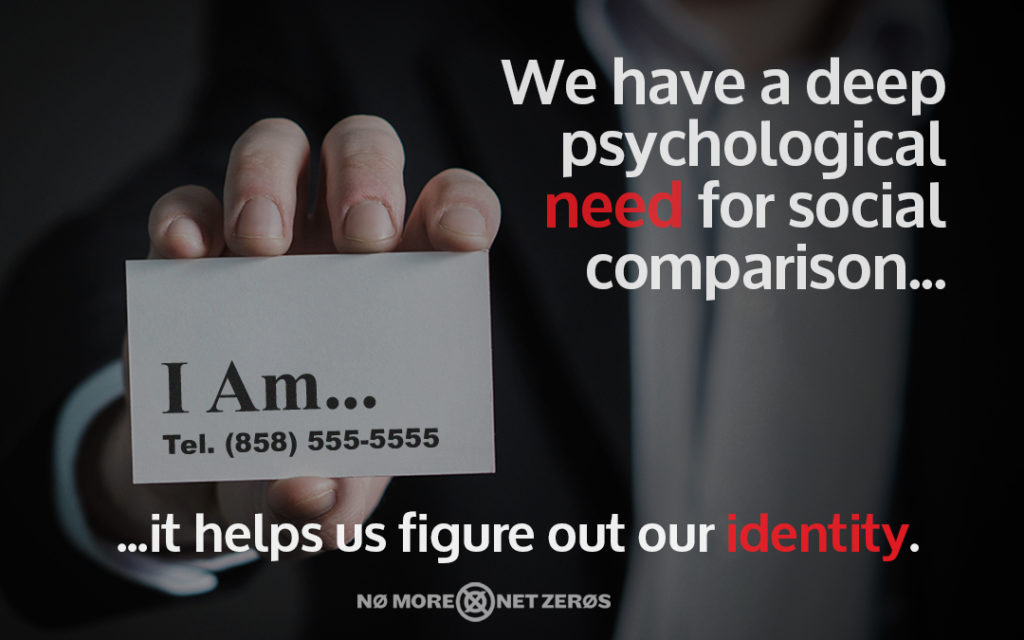
Whether it’s strangers, random people online, friends, family, or even close acquaintances, we can NEVER live without comparing ourselves to others.
It’s a human paradox.
How do we Navigate This?
Comparing ourselves to others DOES have a very high potential to become toxic, but we must do it.
So how do we navigate THAT?
THAT’S the important question.
The one I’m here to answer for you.
This blog post will help you to be able to make healthy comparisons with others that improve your mindset, not harm it.
You’ll be able to recognize the positive and negative traits of comparing yourself to others. I’ll also give you a bunch of personal tools and tactics you can use to navigate this.
With the challenges you’ll be going through living a No More Net Zeros lifestyle, you’ll need this as part of your personal arsenal to fight the world.
And THAT’S what makes this so important.
This is NOT A Psychology Textbook
There are already MANY great articles out there about this topic that go very deeply into the psychology of comparing yourself to others.
This blog isn’t here for that.
It’s not a psychology textbook.
I’m here to help you make positive, personal change in your life.
So, I keep things straight-forward, written to make it easier to apply to your life, and to help you move forward in a stronger, healthier way.
I’m here to help from a No More Net Zeros angle, and how THAT applies to you. Nothing more.
Before I get too far into this, allow me to share a few ways comparing myself to others affected my own life, and why it was so important for me to figure it out.
How Unhealthy Self-Comparison Affected My Life
Before I understood the destructive side of social comparison, I lost quite a few friends and business relationships over the years. I often felt hatred towards people that I viewed through a selfish, personal comparison lens.
In my mind there was only ever competition, so I burned bridges frequently.
I judged people, and often dismissed them as unskilled due to ‘unfair advantages’ I thought they had. Often I walked through life with a huge chip on my shoulder.
Angry at people and over-competitive, I secretly saw people as enemies that could’ve been much closer friends.
I drew a line in the sand wherever I went.
You either stood with me or against me, there was NO in-between.
My Comparisons Were Too Competitive
This competitive nature was GREAT in skate competition. But it killed my attitude towards other people in business and friendships, too.
The most important part of this whole thing wasn’t its effect on others, but how it affected me.
I was NEVER genuinely happy, and carried anger almost everywhere I went. As I fought, struggled, and survived, I made much slower progress, and made my life a lot harder than it could’ve been.
Since learning more about healthy and unhealthy aspects of personal comparisons, I’ve greatly improved my world view, and as a result of that, my relationships, too.
I’m going to share with you the personal tactics and strategies I use daily to improve my life and mindset in this area.
But before I get into tactics and strategies, let’s take a quick look at one important thing.
Why You Need to Compare Yourself to Others
According to social psychologist Leon Festinger’s famous Social Comparison Theory…
…as humans, we can’t define ourselves independently.
We can only define ourselves in relation to someone else.
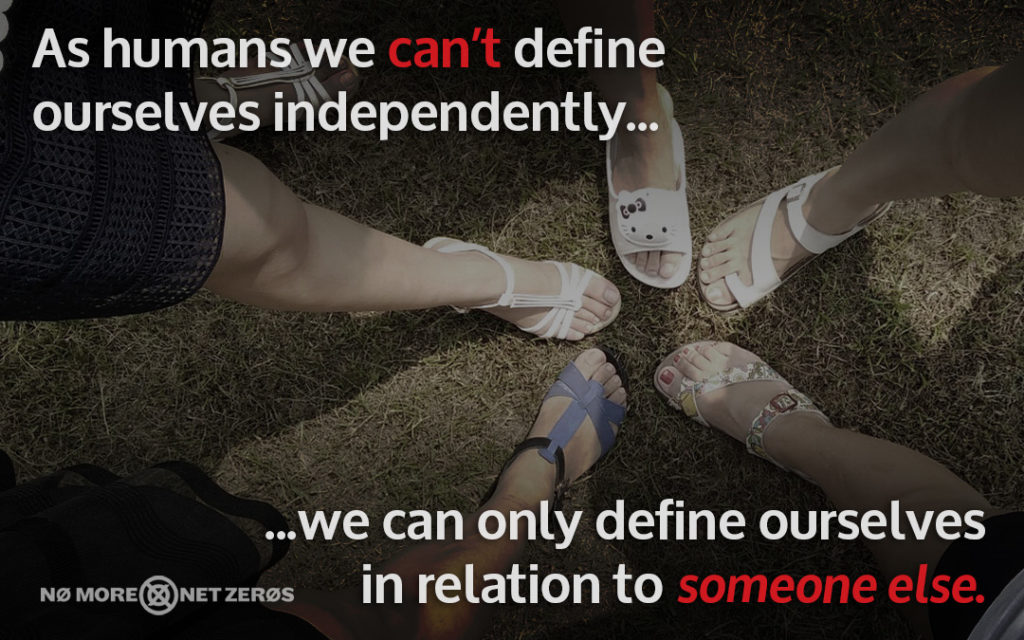
So, when you ask yourself the question ‘Who Am I?’… …you NEED to look at other people to figure that out.
We all like to think we’re unique. The irony is, we need to compare ourselves to others, to form our own identity.
You Compare Yourself to Others to Help you Define Yourself
The two reasons you need to compare ourselves to others in this way, are:
- TO REDUCE DOUBT in the areas you’re comparing yourself
- To learn how to define yourself as individual
Take a look at those two reasons for a moment. Before dismissing them, read and carefully consider each one.
Consider the ways you compare yourself to others.
When you look at other people, do these contexts apply to you?
When I first read them, a light bulb came on for me. I’d never considered there was a deep human NEED to compare ourselves to others. Or that I needed it, in order to form my own identity. But, the more I thought about it, the more it made sense to me.
Everything I’d read in self-improvement said comparing ourselves to others was something I needed to avoid. But the truth is, we can’t. We need it to know who we really are.
There’s a little more to this.
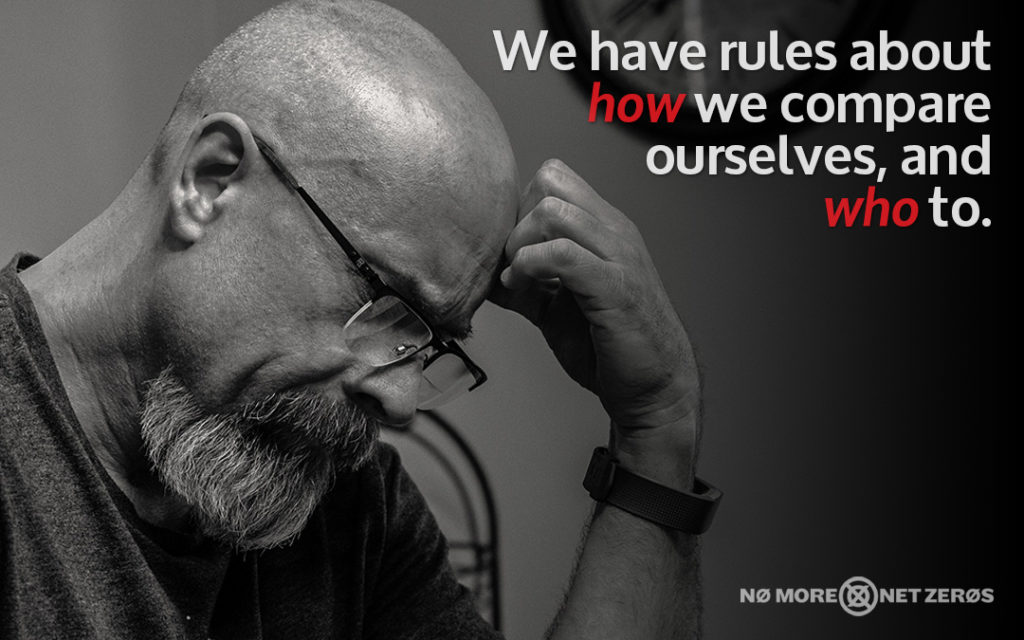
We have RULES about HOW we compare ourselves, and who to.
We Prefer a Fair Comparison
You’re MUCH MORE LIKELY to compare yourself to a person that you’re similar to in opinion, or ability.
You want to compare yourself to someone at your level, because it makes it seem more achievable for you.
This makes the comparison seem fairer.
You Get Nasty When You Compare Yourself to Others
When comparing yourself to someone, if you start to feel negative from the comparison, you’ll replace those negative feelings with anger and hostility towards that person.
So, if the comparison makes us feel bad about ourselves, we get envious, then we mentally tear that person apart.
Ever felt jealous of someone, then found yourself turning against them in your mind?
We do this to make ourselves ‘feel better’ in the moment. It protects us from getting a bruised ego.
This really hit home for me. When I first read about it, I was highly amused. It made me laugh at myself hard, to read the way I react to things described so accurately and easily.
I remember asking myself, “Am I really THAT predictable?”
I’d always felt bad about doing this, like secretly ashamed. It helped to know this is just a normal human reaction.
It turns out I’m not nasty or mean. Just a regular person, after all.
We Conform to Group Mentality
If there’s a group of people we feel are important, the MORE important we think they are…
…the more pressure we feel to conform to the group’s opinions, or abilities.
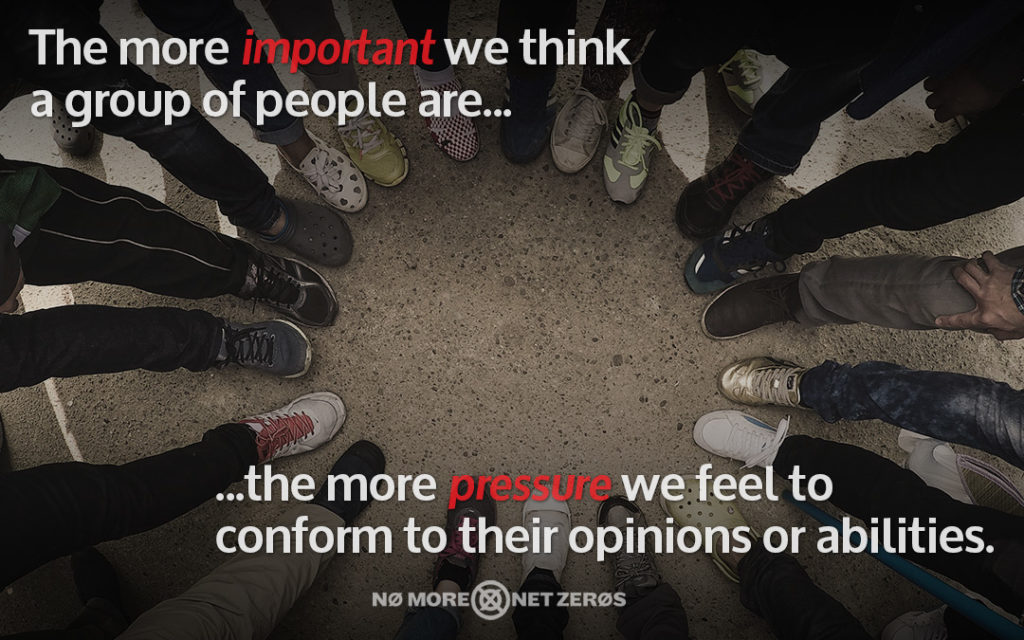
This is just a long way of saying ‘peer-pressure works’. It’s our tribal instincts taking over. All completely natural human behaviors. Part of our original, natural survival instincts kicking in.
Ever worked in an office, or a retail store? Or met a new group of friends? Moved into a new neighborhood?
If you have, you’ve probably seen, felt, and experienced this behavior in action.
In business and self-improvement, if we’re the sum of our 5 closest friends, this part of comparing ourselves to others is something we can use to our own advantage.
We just need to surround ourselves with better people to be influenced by, then casually allow it to happen.
Healthy and Unhealthy Personal Comparisons
We seek other people like us, to define our identity.
This is 100% essential for us to figure out who we are, and where we stand in the world.
If it’s essential, we need it, and can’t avoid it, then what’s the problem?
When do these comparisons with other people become toxic?
As with SO MANY things in life, it’s not WHAT we’re doing, but the WAY we’re doing it.
There are TWO main ways we compare ourselves to others.
Self-Evaluation
The first reason you compare yourself to others is the healthier of the two. In self-evaluation, you’re comparing yourself to other people to see where you stand, or how good you are.
You look for others that have already achieved what you’re trying to achieve, or are slightly ahead of you, tobe inspired by, learn from, and be motivated by them.
Assessing your own ability, seeing where you can improve, etc.
You’re trying to figure out:
- How good you are currently
- What you need to do to improve
- Looking for hints, tips, and secrets
- What you need to do, to get to where they are
- Where you stand in an imaginary league of competition
This can be useful, educational, motivational, and encouraging.
Sometimes you feel like you’re doing great. You’re crushing it and feel you’re much better than the people you’re researching. You’ve got this!
You’ll even come across someone that shows you that you need to level-up. You see what’s possible, where you can get to, and give yourself something to work towards.
This is where things begin to get a little muddy, as the second reason we compare ourselves to others, begins to rear its ugly head.
Self-Enhancement
The negative, toxic side of comparing yourself to others, happens when you’re looking to improve your self-esteem.
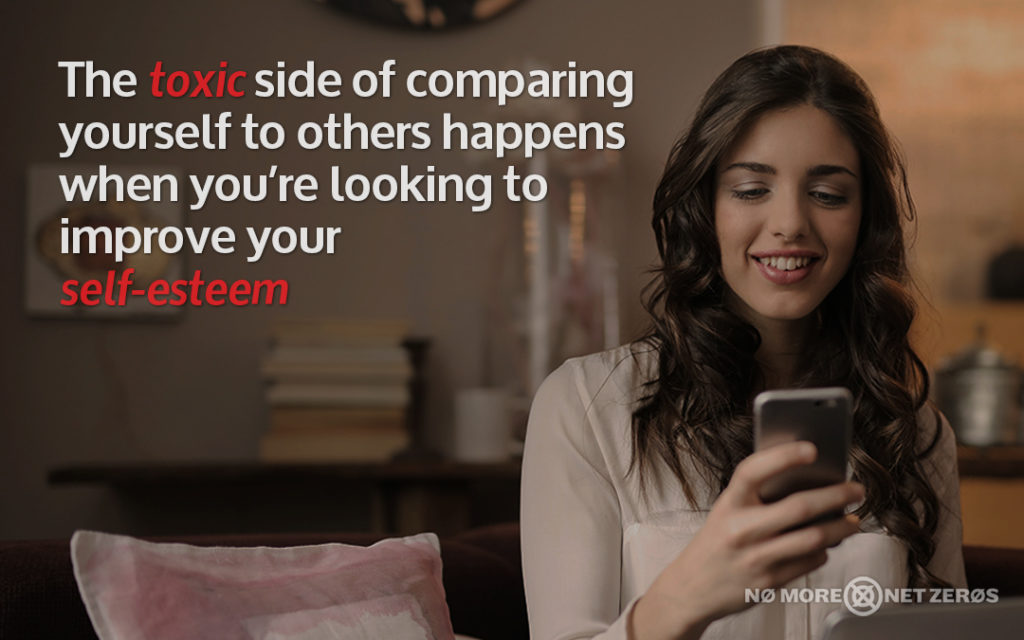
In self-enhancement, you’re comparing yourself to someone else, to feel better about yourself.
When doing so, you’ll often distort or completely ignore information, to see yourself in a more positive light.
You make upward comparisons to people better than you. Or downward comparisons with people ‘worse’ than you, depending on which one makes you feel better about yourself.
If you’re feeling that you suck at something, you’ll probably avoid comparing yourself to someone better than you.
There’s simply no version of reality where you can really make yourself feel better comparing yourself to others, without lying to yourself.
Consider when it comes to money:
Unless you’re the richest person in the world, there’s ALWAYS going to be someone else with more than you.
Neither looking up and lying to yourself about a wealthier person than you, or looking down at someone worse off than you, to increase your self-esteem, are healthy things to do.
You Even Feel Threatened by Similar People
You might also avoid comparing yourself to someone with the same skill level as yourself, if the similarity feels like a threat.
This is the opposite of social comparison for self-evaluation.
If they’re TOO similar to you, you could find yourself putting them down, or downplaying the better sides of them.
You ignore facts, as long as it makes you feel better about yourself. This is the darker place, where your comparison to others becomes dangerous, and bad for you.
You feel deflated, or angry. Then, it often turns into a self-destructive thought pattern, perhaps even making you want to quit.
You Begin to Make Excuses for Yourself
Maybe you can’t figure out what it is they’re doing, that you’re not. So, you disguise it, and downplay it.
You’ll decide they must be cheating or have an unfair advantage you don’t have.
Could it be because they had more money, or are better connected?
EVEN WORSE… …you can NEVER feel good for that person when they do well.
You’ll only have negative feelings towards them, because of the comparison YOU’RE making in your own mind, not them.
When you do something you’re proud of, or happy about, it will NEVER be enough for you. Instead, you continue to compare yourself to others unfairly.
THIS is the unhealthiest, nastiest side of comparing yourself to other people. The worst part is that it hurts ONLY you.
Do you want to know what the super-annoying kicker is, though?
They Both Happen at EXACTLY the SAME TIME
Yeah, that’s right, you read that correctly. Take that in for a moment.
- You NEED to compare yourself to others, and there are pre-written rules in your mind about how you do it.
- There are both healthy benefits, and unhealthy negatives that occur.
- And they BOTH happen, at EXACTLY the same time.
So far, you’d have been forgiven for thinking that you could just compare yourself only in healthy ways, and avoid the unhealthy ways, and be good. Unfortunately, not.
The two ways we compare ourselves to others, good and bad, both happen at the same time.
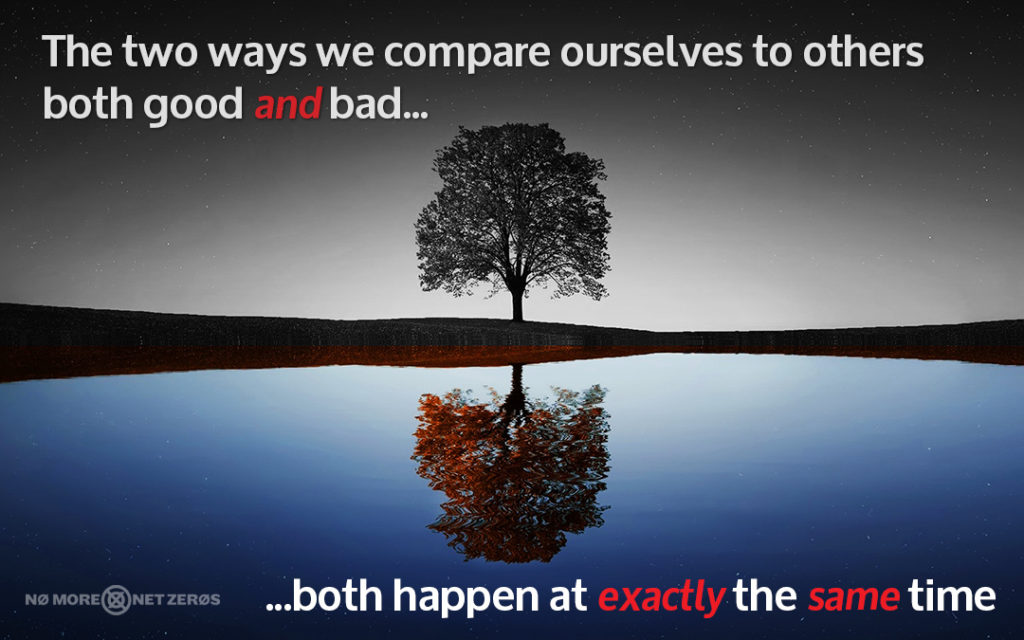
We NEED to do it, and CAN’T do one, without doing the other.
The Social Comparison Framework
The most important part of self-improvement when it comes to comparing yourself to others, is having an understanding of the ‘Social Comparison Framework.’
Reviewing it real quick:
- We MUST compare ourselves to others. You can’t avoid it, or just stop ever, so stop trying. It’s a false narrative pretending it’s possible to not do so.
- Social comparison helps you reduce doubt, and figure out your identity
- You prefer a fair comparison, but get nasty if you don’t like what you see.
- Groups of people that feel important to you, will influence you easily
- The healthy side of the comparison is self-evaluation. Figuring out how good you are, to motivate and encourage yourself
- Social comparison is unhealthy when you’re trying to raise your self-esteem, in self-enhancement
- Both healthy and unhealthy aspects of self-comparison, happen at exactly the same time
Now that we’ve got that covered, let’s take a look at the second section of this blog post, that’s here to help you navigate self-comparison, without destroying your mindset.
How to Compare Yourself to Others and Protect your Mindset
So, how do you navigate comparing yourself to others in a healthy way, and protect your mindset?
Knowing the framework is half the battle. Understanding how these comparisons work, what’s healthy, and what’s not, is extremely useful.
We can’t just shy away from these issues, we need to understand them intimately, and work with them as part of our daily lives.
Be Mindful of When You Compare Yourself to Others
We compare ourselves to others constantly, sometimes even within a moment’s glance.
Often, we’re only passively comparing, so you might not be completely aware of how often you’re doing it.
The first step to navigating self-comparison in a healthy way, is to become more aware of when it’s happening. Initially, just by noticing when you’re comparing yourself to someone. Becoming mindful of it, recognizing when you’re doing so.
Observe without any self-judgement at all.
This comparison is human and is as natural as breathing air.
Accept it for what it is.
A natural part of human life.
Observe the types of Social Comparisons You’re Making
As you become more aware of when you’re comparing yourself to someone else, observe what’s going on in your mind as you do it.
Being aware of our thoughts, and observing them as they happen, is a great way to recognize any patterns that emerge.
Think about the Social Comparison Framework, in relation to your comparison, and ask yourself a few questions.
Can you see where this comparison helps you reduce doubt, or align your identity?
Does it help you to know where you stand in the world?
Which parts of the comparison are where you’re looking to boost self-esteem?
Separate those thoughts in your mind and consider them.
Simply recognize the healthy, and unhealthy parts of the comparison. We’re not trying to do anything about it yet, just observing it in action, watching and feeling what it does.
Take the Positive, Leave the Negative
When comparing yourself to someone else, take the positive useful aspects of the observation, and amplify them. Make the positivity and motivation MASSIVE in your mind.
The parts of the comparison that help you figure out who you are, are useful to you. They help you feel more comfortable in your own shoes. Feel like the person you really want to be, deep down inside.
Know where you fit into the world, feel your importance.
Enjoy this part of the comparison.
Be encouraged, feed your motivation.
It’s healthy to see others’ achievements as encouragement, to learn more, or to grow.
Get as motivated as you possibly can!
Dismiss the Negative Unhealthy Parts of Self Comparison
The negative part of comparing yourself to others, used to improve your self-esteem, is a selfish act.
Take those negative, unhealthy parts of the comparison, recognize them for what they are, and ignore them completely.
Push them aside.
Filter them out.
Or as I like to say, “Fuck them off, completely.”
You don’t need this comparison to increase your self-esteem. It’s all empty calories.
Don’t judge yourself for having these thoughts. Having them is human, it’s a normal part of you, and as you know from the framework, you can’t get the good without the bad.
So, take the good and the bad, and sort through them.
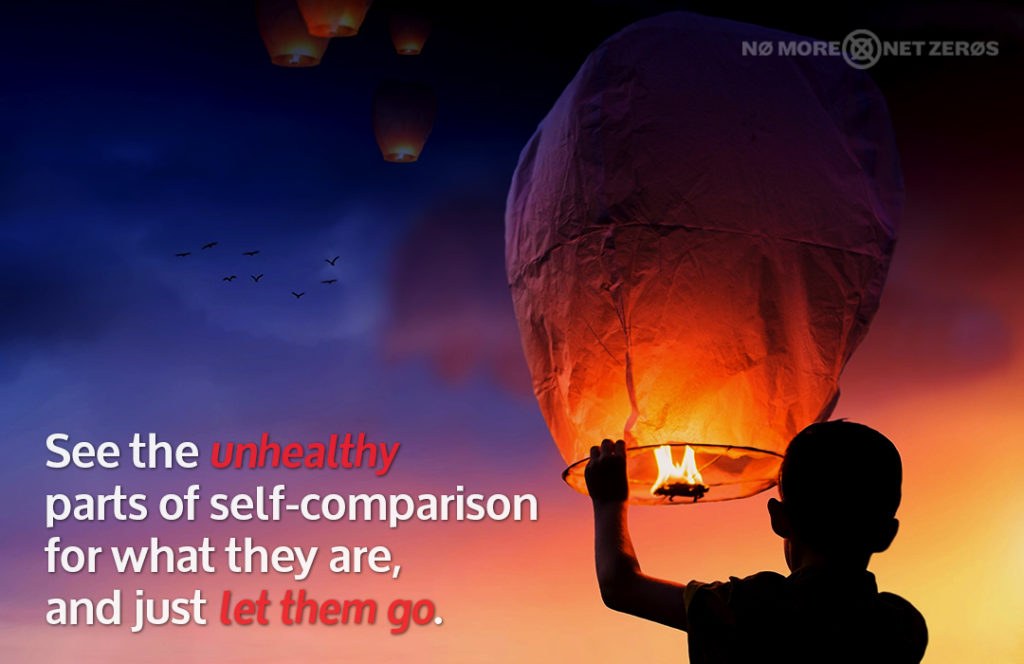
See the unhealthy parts of self comparison for what they are, and just let them go. You only had to experience them to get the good stuff.
Drown out the bad parts with all the good.
Focus on those good elements the most.
Take a Moment for You
If you find yourself comparing yourself to someone only to improve your self-esteem, get out of there.
Stop, and go find something else to do.
Something that can clear your mind, away from other people, where you don’t need to think of others.
Maybe go for a long walk where there’s good air, or a nice view.
Practice mindfulness, calm and clear your mind. Meditation helps a lot with this. Even simple breathing exercises can make a HUGE difference in your life.
Whatever you can do for a little while to remove yourself from the situation, go do something for yourself, and take your mind off the comparison completely.
Clean up or Tidy Some Clutter in Your Life
Tidy an area of your house, wash the car, or clean out a closet. This gives you time to yourself, to focus on something productive, without distraction.
Maybe delete a bunch of emails you don’t need, cancel some of those annoying email subscriptions.
Get rid of some clutter. Go through the old clothes in your closet. Throw those impulse buys away or donate them to charity.
When you’re done, you’ll feel good about yourself, because it was you, and only you, that made that happen. There’s nothing that fixes your self-esteem more than feeling good about doing something productive.
Removing clutter and untidiness in your life gives you back control, and improves your self-esteem, in a positive, healthy way.
These things also help remind yourself that you’re already a good person. Which, of course you really are.
If you weren’t, you wouldn’t be here reading this, or any article about self-improvement. We’re here because we’re all trying to be better people.
Thanks for being here, by the way, I REALLY do appreciate you taking the time to read this blog!
Find your Family, or a Good Friend to Talk To
Family and friends always make us feel better about ourselves.
Whether it’s our kids, parents, or a relative they love you. Good friends do, too!
If you’re overwhelmed from comparing yourself to someone else, call or visit a family member, or a good friend.
Soon, you’ll have forgotten why you’d need to feel better looking at a stranger, with such awesome people in your life.
Do Someone a Good Turn
Doing someone a good turn, ALWAYS makes you feel good about yourself.
Why? Because it’s a genuine selfless act.
Giving feels good, because it IS good!
If you can’t think of anyone to do something for, pay for the person behind you in the line at Starbucks, when buying lunch, or next to you at the bar. And, no, not just a cute girl or guy, that you want the number of.
Giving honestly, will make you feel like a good person, because you’re being one, and you ARE one.
You can’t get better than that.
Personal Reflection and Observation
If you ever notice patterns forming in the unhealthy side of comparing yourself to others, observe that pattern.
When there’s something you often want to make yourself feel better about, maybe you’re telling yourself something. Ask yourself why.
Why is it you constantly compare yourself to someone with relationship issues, or someone with a type of business you’ve always wanted to start?
Whatever it is, it might be something important to you, that you haven’t taken action on yet. Maybe you hadn’t realized it was so important. Or maybe it’s something you’ve always known, but these comparisons have made you feel better about yourself, just enough to stop you from taking action.
If so, why not work on that area of your life, so you can genuinely feel good about it, for yourself, instead?
Taking steps towards what you genuinely want in life, is necessary to genuinely feel good about YOUR side of this.
Is it Just Cheap Dopamine?
Maybe you’re using the comparison to make yourself feel better, as a cheap dopamine fix.
You’re making yourself feel better for a moment or two, only to come back to it again, and again, to feel the same way. This is an addictive behavioral pattern.
Again, 100% normal, and human.
One to recognize, forgive yourself for, and decide what to do about.
Find Someone New to Compare Yourself To
If whenever you compare yourself to a particular person, it ALWAYS becomes more unhealthy than good for you, stop.
Stop looking at their content, reading about them, or comparing them to yourself. Recognize this as unhealthy. It’s bad for you.
Instead, look for someone else to compare yourself to. Someone you can compare yourself to objectively, in a more encouraging, motivational way, with less of the unhealthy part.
Remember, your goal in comparison, is to understand your identity, and gain the positive motivation from the experience. You want to find a healthier, balanced comparison.
Not everyone’s going to do that for you, and that’s okay.
Things to Remember When Comparing
When you ARE comparing yourself to other people, there are a few things you need to ALWAYS consider.
These things will help you maintain a balanced view of the comparison.
You May Never be the Best, and That’s Okay
Unless you’re the fittest, strongest, leanest person in the whole entire world, someone else will be fitter and healthier than you.
But, even the ten-thousandth fittest person in the world, is still extremely fit, healthy, and amazing.
Unless you’re THE richest person in the world, someone else will ALWAYS have more money than you.

Even if you were ‘only’ the 48 millionth richest person in the world, you’d be a millionaire.
That’s right, there are 48 million millionaires in the world today. I know I’d be okay if I was only the 48 millionth richest, wouldn’t you?
And EVEN if you ARE any of the above things, there’ll be SOMETHING ELSE you’re not the best in the world at, too.
They Compare Themselves to Others, Too
The person you’re comparing yourself to, compares themselves to other people, too. They’re human, just like you are, and need it as much as you do.
We are all as insecure as each other, and all need to establish an identity for ourselves.
Those people are no exception to the rule.
Compare Yourself WITH Others not AGAINST
You should never compare your progress in anything to anyone else, against each other. The key word here is ‘against’.
Never compare yourself AGAINST someone, instead of doing something WITH them, and sharing the journey.
This isn’t motivating each other, this is competing with them.
When it comes to competing, only the winners can ever be happy.
Most winners aren’t happy for long. They always want to do better, or want more. This is the problem with competition AGAINST somebody. Truly amazing, top-of-the world, transcendent winners, are only in competition with themselves.
Instead, compare your progress WITH the other person. If they’re doing something better than you, ask for advice in that area.
Share your experience WITH them.
Join them in a quest to achieve your goals.
Even complete strangers in social media will be glad to help someone else in an area they’re good at. It helps their self-esteem to help others, too.
Don’t Compare yourself to Social Media
Let’s be real for a moment here. Social media is not real life.
Every photo, post, tweet, or comment, has been designed to promote the person that posted it.
You’re comparing the very best moments of their lives, with the very worst moments of your own. And that’s not even a fair competition to enter.
Reading someone else’s marketing, will not help your self-esteem, ever. So just don’t.
Comparing Yourself to You
Don’t compare yourself to you, either.
Comparing your unhappy 35 year old dad-bod, to your responsibility-free, skinny-ass 20-year-old old self with the metabolism of a cheetah cub with an amphetamine addiction, won’t help you.
Putting it into perspective, it’s the same as comparing a 9 month old baby’s tennis skills, to that of a 20 year old tennis pro at Wimbledon.
Comparing yourself, to the you from a completely different time, is asking for trouble.
The only you you should compare yourself to, is the one where you started THIS part of your life.
So, if you’re on a health journey, the day you started, is the day to compare to.
Building wealth? Even if this is your 50th attempt, start with the very first day you began THIS journey.
Start Comparing at the Start of the Journey
If you’re building a business, the FIRST day you got the idea, is the day to start comparing your progress to.
At 30 years old, I started a business with the change on my bedroom floor, that grew into a $300,000.00 per year corporation. I became a CEO.
If I was to compare NoMoreNetZeros.com (currently a small blog), to that business at it’s prime success, it wouldn’t feel good for me, at all.
So I compare my progress to where I started THIS project.
I have more blog posts today than I did a few months ago. The site is looking better, and I’m growing.
I look forward to hearing from the first person I’ve helped on their journey, or feedback from this article, but that will come with time.
Follow your progress, stay consistent, and save the comparisons for when it’s fair to do so.
Which leads me to my final piece of advice on this topic.
Be NICE to Yourself
We can all be hard on ourselves. But I want you to understand ONE thing VERY clearly.
You wouldn’t take abuse from anyone else, so why would you take it from yourself?
You set yourself up for unrealistic, unachievable goals, then compare yourself to the world’s best.
STOP THAT SHIT.
Start being nicer to yourself.
I don’t mean you should become lazy, complacent, or stop trying.
Just give yourself a fucking break every-once-in-a-while!
Stop being so hard on yourself.
It’s okay to push yourself, but push yourself too hard, and you’ll hate you for it.
I have a great blog post you should read, that has many different ways in which we need to be nice to ourselves, to maintain balance in our lives.
Reading that blog post will give you many more ways to increase your self-esteem, self-worth, and help you relax, too.
If you have time, check that out.
I know just doing even a couple of things from that list will make your life instantly feel better, no matter what your circumstances are.
Compare Yourself to Others Carefully
When comparing yourself to others, remember the Social Comparison Framework. Know that the unhealthy part, is part of it all.
If you feel overwhelmed, down, or notice your comparisons are hurting you again, come back to this post again, read it through, and apply your new takeaways.
Often when you come back to something, you see it with a fresh perspective, and find different things that will help you.
With that in mind, I’d like to thank you for getting this far.
I hope sincerely that this blog post helps you. If it does, I’d love to hear about it.
Let me know of this helps you. Leave a comment below, email me, or shoot me a message on social media.
If you know somebody else this blog post could help, send them a link, or maybe even share it on your social media profiles, so others can find it, too.
I’d love to hear from you, because afterall, I do this to help everyone get to a position in their lives where they’re moving forward in an easier, better way than ever.
So drop me a line if I did.
That’s all.

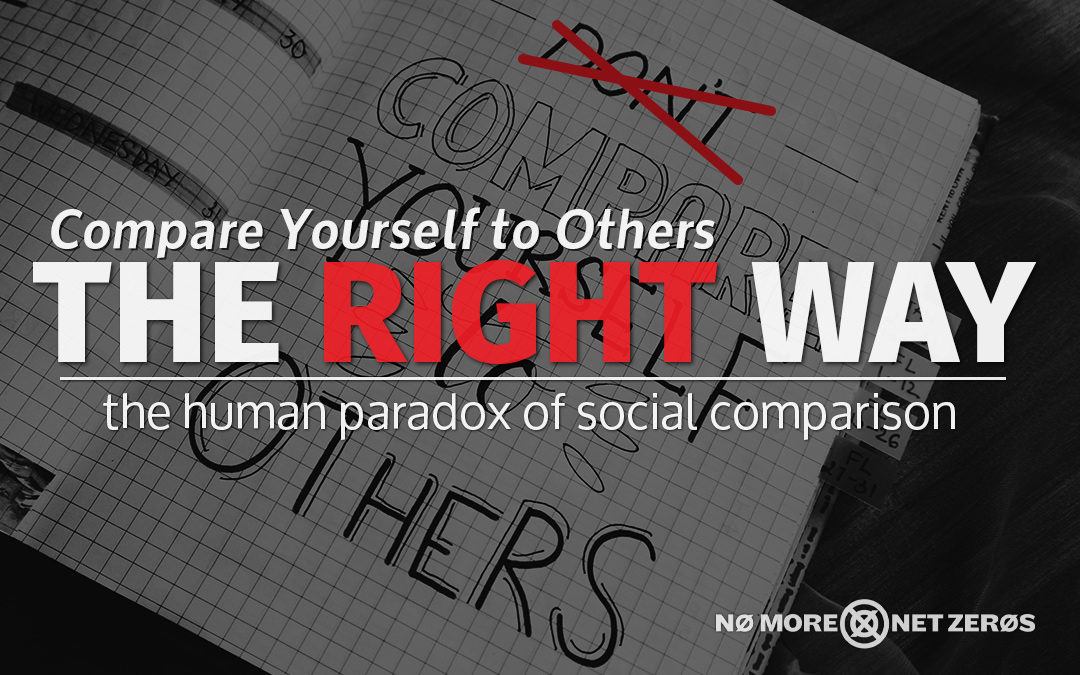
Recent Comments